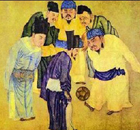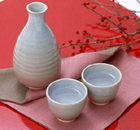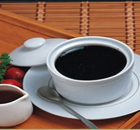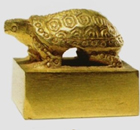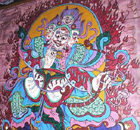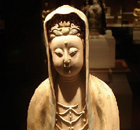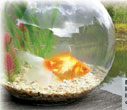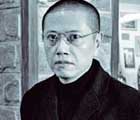Heritage
Hejian poem singing
(chinaculture.org)
Updated: 2006-11-21 14:34
 |
Large Medium Small |
Year: 2006
Sort: Folk Literature
Area: Hebei province
Serial No.: Ⅰ-21
Declarer: Hejian city, Hebei province
The earliest Chinese poetry begins with the Shi Jing, or the Book of Songs, which is sometimes also known as the Book of Odes, a collection of 305 poems of varying length, drawn from all ranks of Chinese society. This is the first comprehensive anthology of Zhou Dynasty (1122BC-256 BC) poems. Each poem in the Book of Songs is set to music and can be sung. Those who compiled it classified the 305 poems into folk songs, ceremonial songs, and sacrificial songs, according to their content and the style of music.
The Book of Songs is said to have been compiled by Confucius himself (551BC-479BC). There were four versions of the collection: those in the states of Lu, Qi and Han, and one in the private collection of Duke Mao. Only the last has survived until now. Hejian city is the cradle of Mao's version of the Book of Songs.
Hejian lies between two rivers on the plain in the center of Hebei province. Mao Heng, a student of philosopher Xunzi (475BC-221BC) who developed a new version of Confucianism in the period 298-238BC, wrote a book named Shi Jing Xun Hu Zhuan, or An Explanation of The Book of Songs in the city of Hejian. Since then, Hejian has developed a unique way to recite them - to sing them using ancient language and tones.
The Hejian poem song is a combination of ancient folk literature and music. It is an oral recording of the Book of Songs, which has been orally passed down over thousands of years. The culture of the Book Of Songs in Hejian is shown in four major ways: the appearance and spread of poem songs; in the spread of the Book Of Songs, related legends and some village names that were derived from it; Mao's school built in the Yuan Dynasty (1271-1368AD) nurtured lots of talent and left poems, articles, steles relating to the Book of Songs; and it has been a tradition among locals to love poems, write poems, and study poems, which gave rise to a group of poets in the area.
However, it is hard to find young singers, and this historical art urgently needs attention and protection.
The following is a poem titled Guan Ju in the Arts of the States section from the Book of Songs.
'Guan, guan', cry the ospreys on the isle in the river.
The reclusive, modest girl
Is a good mate for the noble man.
Long and short is the duckweed
To the left and to the right we look for it.
The reclusive, modest girlWaking and sleeping he seeks her.
He seeks her and does not obtain her.
Waking and sleeping he pines and yearns for her.
Oh, anxiety! Oh, anxiety!
He tosses and twists and turns onto his side.
Long and short is the duckweed.
To the left and to the right we gather it.
The reclusive, modest girl
Among cithers and lutes, he shows her his friendship.
Long and short is the duckweed.
To the left and to the right we pick it.
The reclusive, modest girl,
As a bell to a drum, he delights in her.
(Translation: Paul R. Goldin)
